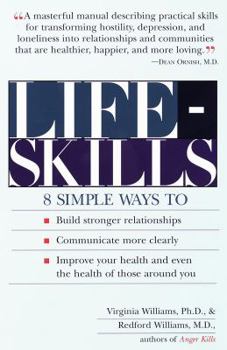Lifeskills: 8 Simple Ways to Build Stronger Relationships, Communicate More Clearly, and Imp Rove Your Health
Select Format
Select Condition 
Book Overview
Here are the eight skills this book will help you master: 1. Identify your thoughts and feelings: how to tap into your feelings, especially the negative ones 2. Evaluate your negative feelings,... This description may be from another edition of this product.
Format:Hardcover
Language:English
ISBN:081292424X
ISBN13:9780812924244
Release Date:January 1998
Publisher:Crown Publishing Group (NY)
Length:344 Pages
Weight:1.60 lbs.
Dimensions:1.3" x 6.5" x 9.6"
Customer Reviews
3 ratings
The skills are "simple," but very hard to implement
Published by Thriftbooks.com User , 21 years ago
These truly are "Life" skills in two ways--they help you live your life positively/effectively and they take a lifetime to master. There are no quick cures or miracle pills in this book. The "book description" lists the 8 skills taught in the book. Here are some more details about each skill. 1. Identify your thoughts and feelings. Acknowledge the feelings you are having; you cannot address the negative ones unless you are honest about them. Don't deny negative feelings because you feel guilty or bad about having them (anger fear, jealousy, insecurity, etc.). Don't let anyone tell you that you shouldn't be feeling them or that they are not real. Try writing down your thoughts and feelings. Write the situation that led up to them. 2. Evaluate negative thoughts/feelings.Observe the objective facts that led up to the negative thoughts/feelings; do not make any assumptions or interpretations. Then, ask yourself 4 questions: Is this matter Important to me?Are my thoughts/feelings Appropriate given the objective facts? Is the situation Modifiable? Given my needs and the needs of others, is taking action Worth It? If the answer to any of the 4 questions is no, then try to accept the status quo. To quell negative thoughts that might linger, reason with yourself, distract yourself from the situation, or meditate. If all of the 4 answers are yes, decide if the problem is a situation or a person. If it is just a situation, you need to solve the problem. If it is a person, decide between assertion and acceptance (details below).3. Communicate better. Listen to others. Have positive body language (lean forward slightly, look at the speaker, uncross your arms). Reflect back what you hear ("What I hear you saying is..."). Avoid responses that are hostile or evasive ("that may be..." "well of course..."). Do not give advice or bring the focus back to you. Do not judge or grill. You must hear, not just listen. Be willing to be changed by what you hear.Speak with compassion. Make "I" statements instead of drawing general conclusions or blame statements ("I don't like it" vs. "It stinks;" "I feel sad" vs. "You are mean"). Speak about specifics when possible ("You promised to clean up the room this morning but it is still a mess" vs. "You never clean up"). 4. Empathize with and understand other's behavior.Learn what the other person is thinking and feeling. Be aware of how that person perceives himself or herself. Try to appreciate where the other person is coming from.5. Solve problems (when it's a situation rather than a person, that's the source of distress).Define the problem. Generate alternatives. Make a decision. Implement the decision. Evaluate the outcome. 6. Practice assertion. Ask for what you want and need. Spell out the situation that is leading up to your request (perhaps including how it makes you feel), and then be specific in your request. If this repeatedly fails to be effective you may need to add consequences. Learn to say no (restate the request
An excellent guide to improving health and relationships
Published by Thriftbooks.com User , 25 years ago
"Lifeskills" focuses on what is important to us all: successful relationships and a healthy approach to getting along with others. This is not just another "how to" book but one that combines scientific research with common-sense readability. This insightful book gives helpful suggestions for improving and enhancing your approach and attitudes at home, at work, and in all of your encounters . Specific exercises are listed after each chapter to help the reader act on the ideas just presented. HIGHLY RECOMMENDED!!!
This book really makes a difference!
Published by Thriftbooks.com User , 25 years ago
Lifeskills makes a difference for all kinds of relationships with family, friends, and coworkers. The book helps you recognize strengths and problem areas that currently affect your relationships and then walks you through 8 steps for improving relationships and communication. Lifeskills also provides scientific evidence for how following these steps can make you healthier. The book is well written and easy and enjoyable to read.





